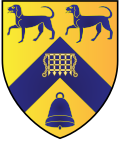Portal:University of Oxford
| Main page | Indices | Projects |
The University of Oxford portal
The University of Oxford is a collegiate research university in Oxford, England. There is evidence of teaching as early as 1096, making it the oldest university in the English-speaking world and the world's second-oldest university in continuous operation. It grew rapidly from 1167, when Henry II banned English students from attending the University of Paris. After disputes between students and Oxford townsfolk in 1209, some academics fled north-east to Cambridge where they established what became the University of Cambridge. The two English ancient universities share many common features and are jointly referred to as Oxbridge.
The University of Oxford is made up of thirty-nine semi-autonomous constituent colleges, four permanent private halls, and a range of academic departments which are organised into four divisions. Each college is a self-governing institution within the university, controlling its own membership and having its own internal structure and activities. All students are members of a college.
It does not have a main campus, but its buildings and facilities are scattered throughout the city centre. Undergraduate teaching at Oxford consists of lectures, small-group tutorials at the colleges and halls, seminars, laboratory work and occasionally further tutorials provided by the central university faculties and departments. Postgraduate teaching is provided in a predominantly centralised fashion.
Oxford operates the Ashmolean Museum, the world's oldest university museum; Oxford University Press, the largest university press in the world; and the largest academic library system nationwide. In the fiscal year ending 31 July 2023, the university had a total consolidated income of £2.92 billion, of which £789 million was from research grants and contracts.
Oxford has educated a wide range of notable alumni, including 30 prime ministers of the United Kingdom and many heads of state and government around the world. 73 Nobel Prize laureates, 4 Fields Medalists, and 6 Turing Award winners have matriculated, worked, or held visiting fellowships at the University of Oxford, while its alumni have won 160 Olympic medals. Oxford is the home of numerous scholarships, including the Rhodes Scholarship, one of the oldest international graduate scholarship programmes. (Full article...)
Selected article
The position of Boden Professor of Sanskrit was established in 1832 with money bequeathed to the university by Joseph Boden, a retired soldier who had worked for the East India Company. He wanted a Sanskrit professor to assist in converting British India to Christianity. The first two professors were elected by Oxford graduates; the 1860 election, in particular, was hotly contested. Reforms of Oxford implemented in 1882 removed all mention of Boden's original purpose, removed the power to elect the professor from graduates, and gave the holder of the professorship a fellowship at Balliol College (pictured). To date, Sir Monier Monier-Williams (professor 1860–99) has held the chair for the longest, although a deputy carried out his teaching duties for the last 11 years of his life. The current holder (as of 2014), Christopher Minkowski, was appointed in 2005 and is the eighth Boden professor. It is the only remaining Sanskrit professorship in the United Kingdom. (Full article...)
Selected biography
Selected college or hall
Lady Margaret Hall (generally known as "LMH") was established in 1878 and was the first college for women at the university. It began to admit men as students in 1979, and was the first of the women's colleges (along with St Anne's) to become a mixed-sex institution. The college, set in spacious grounds in Norham Gardens to the north of the city centre, is named after Lady Margaret Beaufort, mother of King Henry VII and a renowned patron of learning. Its first principal was Elizabeth Wordsworth, the great-niece of the poet William Wordsworth. Giles Gilbert Scott, famous for designing Liverpool Cathedral and the K2 red telephone box, designed the college's Byzantine-style chapel. There are approximately 600 undergraduate and postgraduate students; former students include the former prime minister of Pakistan Benazir Bhutto, the writer Antonia Fraser, the former director general of MI5 Eliza Manningham-Buller, and the actor Samuel West. LMH's motto is "Souvent me Souviens", an Old French phrase meaning "I remember often". (Full article...)
Selected image

Did you know
Articles from Wikipedia's "Did You Know" archives about the university and people associated with it:
- ... that the Laura Spence Affair was a major UK political row started over comments made by Chancellor of the Exchequer Gordon Brown (pictured) accusing Oxford of elitism?
- ... that in his first murder case, real estate and divorce laws specialist Frederick Geoffrey Lawrence saved suspected serial killer Dr John Bodkin Adams from being hanged?
- ... that former Anglican clergyman and Liberal Party life peer Tim Beaumont was the only Green Party representative in the Parliament of the United Kingdom from 1999 until his death in 2008?
- ... that Kenneth Woollcombe, a former Bishop of Oxford, was a member of the Court of Ecclesiastical Causes Reserved when it granted a faculty for the controversial altar by Henry Moore?
- ... that despite being personal secretary to the Chancellor of the Exchequer, Francis Charles Lawley's attempts at insider trading resulted in losses?
Selected quotation
Selected panorama
On this day
Events for 22 May relating to the university, its colleges, academics and alumni. College affiliations are marked in brackets.
|
Births
|
Deaths
|
Wikimedia
The following Wikimedia Foundation sister projects provide more on this subject:
-
Commons
Free media repository -
Wikibooks
Free textbooks and manuals -
Wikidata
Free knowledge base -
Wikinews
Free-content news -
Wikiquote
Collection of quotations -
Wikisource
Free-content library -
Wikiversity
Free learning tools -
Wikivoyage
Free travel guide -
Wiktionary
Dictionary and thesaurus















